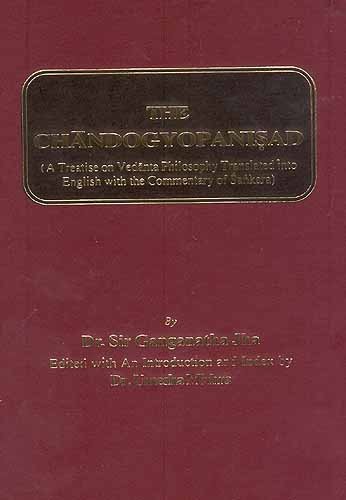Chandogya Upanishad (Shankara Bhashya)
by Ganganatha Jha | 1942 | 149,749 words | ISBN-10: 8170842840 | ISBN-13: 9788170842842
This is the English translation of the Chandogya Upanishad, an ancient philosophical text originally written in Sanksrit and dating to at least the 8th century BCE. Having eight chapters (adhyayas) and many sub-sections (khandas), this text is counted among the largest of it's kind. The Chandogya Upanishad, being connected to the Samaveda, represen...
Section 7.8 (eighth khaṇḍa) (two texts)
Upaniṣad text:
‘Power is greater than Learning.—A single man with Power shakes a hundred men with Learning. When a man has Power, he rises; rising, he serves; serving, he approaches nearer; approaching nearer, he sees, hears, reflects, understands, acts and feels. It is by Power that the Earth stands; by Power, the Sky; by Power, the Heaven; by Power, the mountains; by Power, Deities and men; by Power, cattle, birds, grasses and trees, beasts down to ants and worms; and by Power does the world stand. Meditate upon Power.’—(1)
‘One who meditates upon Power as Brahman, becomes free to do as he wishes, in the sphere within reach of Power;—one who meditates upon Power as Brahman'—‘Is there anything greater than Power, Revered Sir?’—‘Certainly, there is something greater than Power,’—‘Explain that to me, Revered Sir.’—(2)
Commentary (Śaṅkara Bhāṣya):
Power is greater than Learning—‘Power’ stands for that capacity of the mind to apprehend things which is due to the use of food; as says the Śruti—: through fasting, the Ṛk and other Vedas do not reveal themselves to me’;—in the body also, Power consists in the capacity to rise and do such things.—Because a single person with Power shakes a hundred men with Learning,— just as the infuriated elephants scatter a hundred men even when assembled together,—because the Power brought about by the use of Food is so,—therefore, when a man has Power,—i.e., through Power, becomes powerful,—then, he rises,—i.e., he does the act of rising;—rising, he serves—of instructions and the teacher, the performer of service;—serving, he approaches nearer,—i.e., approaching nearer to the teacher etc., he becomes familiar and dear to them;—approaching nearer, he sees, with concentrated attention, the teacher and other instructors;—then he hears what they say;—then he reflects upon what he has heard, with due reasoning etc. ‘This is what they have said, and it is quite reasonable’;—having reflected over it, he understands it, concluding that ‘it must be so and so’;—having thus come to a definite conclusion, he acts, carries into practice what he has been taught;—and then he feels,—i.e. experiences the effects of his action,—further, the greatness of Power lies in this that by Power does the world stand etc,, etc.,—the meaning of all which is simple.—(1-2)
End of Section (8) of Discourse VII.
